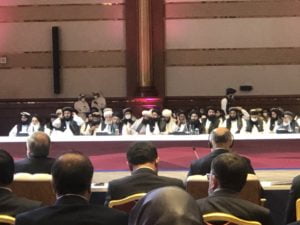In a historic event, representatives of the Afghan government and Taliban met for the first time in Doha, Qatar, on Saturday for the inauguration ceremony of the peace talks to attempt an end to the over 40-year-long war in Afghanistan through a political settlement.
The Taliban issued a statement to express willingness to participate in the negotiations. “The Islamic Emirate (read Taliban) intends to bring about a comprehensive peace and pure Islamic system in the framework of our Islamic value and higher national interests,” Dr Muhammad Naeem, the spokesperson of the Taliban’s political office in Doha, said.
Calling it a historic opportunity to end the war, the US Special Representative for Afghanistan Reconciliation, Zalmay Khalilzad, also highlighted the complexity and challenges of the process. “No important achievement is ever easy. There is no political settlement without compromises,” Khalilzad tweeted.

Since 1979, this is the closest when all the parties involved in Afghan wars have ever reached a consensus for a comprehensive political settlement. However, hammering a deal for a lasting political structure for Afghanistan remains a tough nut to crack. This is so because the Taliban and Afghan states have totally different sets of value systems regarding basic human rights, especially of women.
The peace talks have also raised hopes among ordinary Afghans for an immediate ceasefire. “Afghans have changed now and have different opinions about the Taliban. Looking back to 20 years from now, I can express it wholeheartedly that the Taliban will also show flexibility this time,” said Eid Muhammad Liwal, a 28-year-old professional in Kabul.
Omar Samad, a former Afghan diplomat and senior fellow at Washington-based think tank Atlantic Council, said, “Some in the leadership rank (of the Taliban) are more open, practical and less ideological compared to the leaders 20 years ago.”
Samad, however, added, “Whether the Taliban has fundamentally changed or not is a question that will be answered in the next few months as all sides sit at the talks table to discuss visions, objectives and power sharing.”
In the last six months, there has been a spike in violence and the Afghan government along with international players has been demanding a ceasefire, an issue that is likely to figure in the first round of talks. The Taliban seems reluctant to agree on a complete ceasefire until the outfit gets some good bargain — an unlikely scenario, at least, in the initial phase of the negotiations.
A recent report ‘Taking Stocks of the Taliban’s Perspective on Peace’ by Crisis Group indicated the same. “Field commanders fear that the insurgency risks losing momentum if once the rank and file stop fighting and it would be hard for them to resume fighting if talks break down,” the report stated.
As the Afghan government and Taliban sit for historic talks, expectation of a ceasefire, for a nation ravaged by war since 1979, would not be too much to expect from the warring sides. But in the case of Afghanistan — where violence has been used as a means to achieve power and legitimacy — issues that concern the ordinary Afghans have a long precedence of taking the back seat.
The US-Taliban deal, signed on February 29 this year, is most likely to affect India’s prospects in Afghanistan as the foreign troops are set to withdraw from that country. India, officially, doesn’t recognise the Taliban and, unlike many other nations, has refused to open any contacts with the outfit yet.
The Taliban’s return to Kabul also casts a shadow on New Delhi’s role in Afghanistan as major capacity builder and humanitarian assistance provider nation — a role that Taliban’s patron, Pakistan, has long been objecting to.



